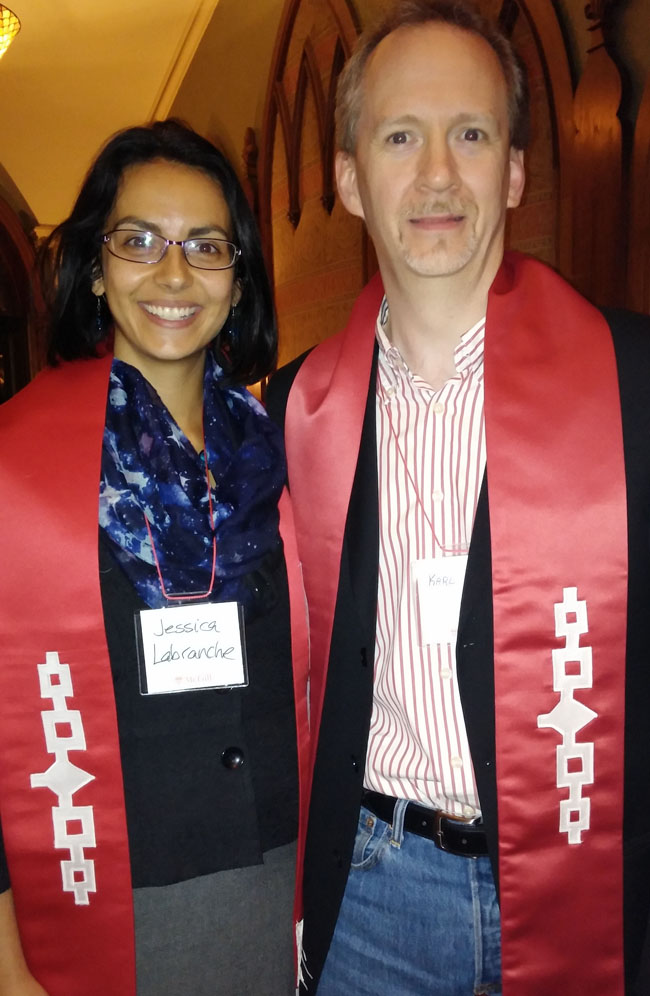McGill’s first indigenous homecoming a success

By Karl Hele
MONTREAL – As part of McGill University’s Fourth Annual Indigenous Awareness Week, the first ever Indigenous Homecoming event took place Sept. 18.
Paige Isaac, Listuguj Mi’kmaq and Coordinator of McGill’s First Peoples House, helped organize the event along with Alumni Services and the Social Equity and Diversity Education Office. In attendance were 20 alumni representing many of the faculties at McGill – Law, Social Work, Education, Arts, Science and Medicine – and holding certificates, bachelors, masters, and doctorates.
Each McGill graduate, past or present, is presented with a red scarf on which is an embroidered eagle feather and the Hiawatha wampum belt. It was very moving and impressive to see the twenty students wearing their scarves with pride. Hopefully McGill’s President, who briefly addressed those gathered, noted the impressive array of Indigenous alumni and their wide-ranging careers.
Two Anishinaabeg alumni from northern Ontario were present at the event: Karl Hele (Garden River First Nation) who is the Director of the First Peoples Studies program at Concordia and Jessica Labranche (Epangishmok Aandeh Kwe, Ahjijawk doodem) who is a lawyer working with Hutchins Legal Inc. Labranche, a non-status Anishinaabe woman whose mother hails from Michipicoten First Nation, is a holder of eagle and condor feathers as well as a pipe carrier, works primarily on treaty and land entitlements. For her “Homecoming is a wonderful opportunity to celebrate the collective achievements of indigenous alumni, to reconnect or even meet new colleagues – to network with and encourage new students.”
Similarly, for Isaac the Homecoming was about connecting past and present Indigenous students while encouraging continued links with McGill. She notes that “it was important for networking and to really highlight the talent of Indigenous alumni who are doing great working in the community.” And, “it’s important to build our connections with them because I think they could provide an important voice in enhancing the next generations in mind.”
In addition to connecting graduates and current students, the Homecoming event was keynoted by Dr. Audra Simpson, Mohawk from Kahnawake and faculty member at Columbia University. Dr. Simpson’s address, sprinkled with humour and irony, touched on her experiences as a student at McGill as well as the university’s obligation to the Haudenosaunee community and all Indigenous peoples.
While she spoke highly of the university’s recent efforts to improve the university experience of Indigenous students, Dr. Simpson did critique the university and its Anthropology department as being overtly ‘white’ and for failing to hire Indigenous people into tenure or tenure-stream positions. Additionally, she spoke of McGill’s obligations not only in abstract terms; she directly challenged the school to live up to its financial obligations.
Apparently, McGill in the 1850s was loaned $8,000 from the Six Nations of the Grand River First Nation by the Department of Indian Affairs. The debt remains outstanding. Once inflation and interest is calculated the debt soars to potentially a billion dollars. With this debt in mind, Simpson called on McGill to do more.
Homecoming by all accounts was a success. Students, current and former, were able to meet, share stories, and network. McGill was pressed to continue its current indigenization efforts as well as strive for greater inclusion of Indigenous people in its academy. Visually, Homecoming showed that Indigenous people are succeeding at McGill despite obstacles and that it has a growing cadre of alumni who are proud of the alma mater while demanding it change.

